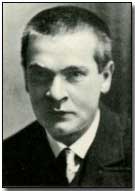Prose & Poetry - Georg Trakl
 Georg Trakl (1887-1914),
the Austrian Expressionist poet, served with the Austrian army during the
first three months of the war before committing suicide on 3/4 November
1914.
Georg Trakl (1887-1914),
the Austrian Expressionist poet, served with the Austrian army during the
first three months of the war before committing suicide on 3/4 November
1914.
Born to a middle class Protestant family in Salzburg on 3 February 1887, Trakl's mother was unhappy throughout his childhood and considered emotionally unstable. In turn, as Trakl progressed through his own childhood he began himself to withdraw from friends and family and similarly demonstrated early signs of emotional instability.
Taking to opium, chloroform and alcohol Trakl failed his school courses and was obliged to re-take a year. Meanwhile he developed a close attachment to his sister Grete, leading some critics to speculate upon a possibly incestuous relationship.
Trakl's initial attempts at poetry were uniformly unsuccessful; at this time he also wrote brief articles for a local newspaper and two one-act plays (both also unsuccessful).
Dropping out of school and deciding upon a career as a pharmacist's apprentice, Trakl's choice of profession afforded him ready access to satisfy a by now confirmed drug habit. He went on to study pharmacy in Vienna although the death of his father prior to the completion of his course caused Trakl financial hardship.
Trakl next spent a period drafted into the Austrian army before re-emerging into civilian life with clear mental problems. Unable to hold down any job he spent time at a hospital in Innsbruck where he met a number of avant-garde artists including Ludwig von Ficker, editor of the Der Brenner journal.
Ficker encouraged Trakl and regularly published his poems, which by now largely concerned themselves with decay, courage and the search for God. Subsequently choosing to live with Ficker Trakl finally achieved success with the decision of Kafka's publisher Kurt Wolff to publish a collection of Trakl's poetry in 1913.
Drafted into the Austrian army with the arrival of war in August 1914 as a Lieutenant with the Austrian Medical Corps Trakl was also the recipient of a sizeable donation from Ludwig Wittgenstein, although he never had the opportunity to use it before his death. Hospitalised for depression he regularly threatened to commit suicide.
Assigned to a hospital in Poland in November 1914 in the wake of the Battle of Grodek, Trakl found himself required to care single-handedly for some 90 men, a task which broke him emotionally. He committed suicide via a cocaine overdose on 3/4 November 1914, shortly before Wittgenstein was due to pay him a visit of encouragement.
His sister, Grete, by now also a drug addict, similarly committed suicide some three years later.
The Russian war ace Alexander Kozakov claimed 20 victories during the war; his nearest compatriot, Vasili Yanchenko, claimed 16.
- Did you know?
